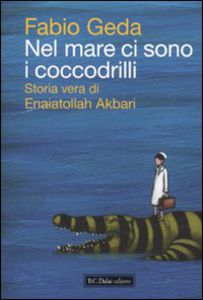
This project promotes open access materials and has been funded with support from the European Commission - Erasmus+ program. These materials reflect the views only of the author, and the Commission cannot be held responsible for any use which may be made of the information contained therein.
[Project Number: 2016-1-HR01-KA201-022159]
![]()
Title of Activity
On a journey … but not on holiday.
Description of educational activity
Duration: 4 lessons (6 hours)
Pupils’ age: 15-16
Organization of the class of pupils: individual, pair and group work
The aim of the lesson: the aim of this activity is to get a deep insight into the human experience of being an exile from an emotional, "physical" and literary perspective. The students will have the opportunity to share the main character's long and perilous journey and will get a closer view of his world, his geographical reality, his inner journey, while partaking his discovery of different realities, worlds, attitudes and behaviours.
After all, the theme of migration has increasingly inspired the world literature, while placing more emphasis on autobiographical experiences reported by very young writers and providing stimuli and means to learn that each of us can be considered an "outsider" depending on the situation.
Support materials:
- Book, Atlas, Maps
- Encyclopaedias
- Internet sites
- Films
- Six worksheets on reading /reflection activities in order to carry out in-depth tasks on six themes related to the six chapters
- Books written by other authors on the same theme
Activities:
First of all, students are expected to read the book
- The students are divided into six groups.
- Each group is assigned one of the chapters regarding one the countries the main character had to go through (Afghanistan, Pakistan…)
- The students carry out research on places, borders, distances, customs, possible literary links to other witnesses … of the countries they were assigned. They will choose meaningful and specific images to “trace” the journey experienced by the main character in a very realistic way
- Students will also do in-depth/follow-up exercises included in the worksheets
- the members of each group will present their research/work, while summing up the main events regarding the assigned countries and providing more details on people and realities. Then, it will be the turn of another group to deal with the following country according to the chronological order of the events.
- Students will publish their final output on the project Facebook page
Great importance will be given to debriefing: a moment devoted to reflection, reassembling and analysis of the activity, thus promoting the collective exchange of opinions, the detection of difficult problems and, finally, the results of the learning process.
Evaluation and assessment method:
In order to evaluate the activity, students are asked:
- to orally present their works
- to draw a map of the protagonist's journey in no more than 10 minutes where they mark and colour countries, borders (confine), towns and journey.
Effect of the activity on RSP reading:
Students will be aware of today's burning issues such as prejudices, racism, conflicts, minors' rights, motherhood, borders closing,..., while learning about people's welcoming attitudes and generosity. It may be the starting point for bridging cultural gaps between European and non-European countries.
Connection to curriculum
Grade: 2nd grade
Scientific curriculum: during the second year the study of literature is focused on
- Improving oral and written skills and competences.
- Improving reading skills, understanding and analysing , specifically, literary texts, but also devoting attention to non-literary texts and non-verbal languages.
- Learning how to build up and understand the historical and cultural context regarding the texts
Knowledge:
- Singling out the context, the aim and the addressee of the communication
- Learning the different reading techniques
- Develop reading fluency
- Improve reading comprehension
Skills:
- Access and organize and use information
- Express ideas and Justify arguments
- Select appropriate media
- Analyze complex systems
- Reflect on learning
- Draw conclusions
- Ask clarifying questions
- Presentation before an audience
- Improved use of vocabulary, spelling, syntax and expression
Bibliographic reference to be used during the activity
Italian version
Fabio Geda
Nel mare ci sono i coccodrilli. Storia vera di Enaiatollah Akbari
Publisher: Dalani
ISBN: 9788860736475
Page count: 155
Year of issue: 2010

English version
Hardcover, 215 pages
Published August 9th 2011 by Doubleday (first published 2010)
Original Title: Nel mare ci sono i coccodrilli. Storia vera di Enaiatollah Akbari
ISBN: 0385534736 (ISBN13: 9780385534734)
Edition Language: English

Literary Awards: Marsh Award for Children's Literature in Translation (2013), John Florio Prize Nominee for Howard Curtis (2012)
Digital sources
Meet the authors at bookshops and booktrailers:
- https://www.youtube.com/watch?v=Qvk13yu4mik
- https://www.youtube.com/watch?v=3ZOSoIsr6Qs
- https://www.youtube.com/watch?v=BLsZbSaWbOw
Results
The students are expected to :
- be fully involved in the main character's experiences, from an emotional and intellectual point of view
- eagerly learn new tips about different cultures as well as about those geographical areas which have become migration routes in the last few years
- get a deeper knowledge about the difficulties encountered by those migrants who haven't come of age yet
- connect information and data, do research, become aware of problems related to migration, work in groups.
Recommendations
Creating “environments” promoting learning (scaffolding) and working in groups (cooperative learning) are to be prioritised in order to:
- foster students' activities and knowledge;
- favour research and investigation;
- promote collaborative learning and students' sharing;
- enhance the students' individual learning process;
- devising teaching units as workshops
- properly inform students about diversity
Contact
X gimnazija ''Ivan Supek''
Ul. Vjekoslava Klaića 7
10000
Zagreb
E-mail: partners@handbook4rspreaders.org










